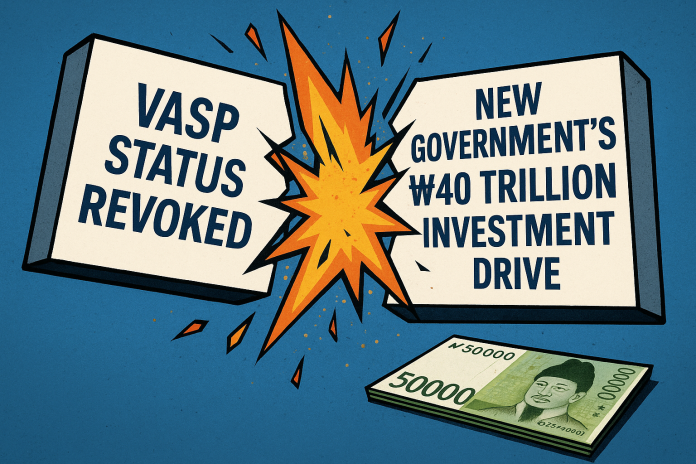
As the South Korean government announces plans to inject ₩40 trillion into the national venture ecosystem, a recent policy move is drawing criticism for effectively excluding key innovation-driven tech firms. The Ministry of SMEs and Startups has initiated procedures to revoke the venture certifications of several firms registered as Virtual Asset Service Providers (VASPs).
This action is based on a 2018 amendment to the Enforcement Decree of the Special Act on the Promotion of Venture Businesses, which classifies “crypto asset trading and brokerage” as speculative industries, thereby excluding them from venture status. However, the regulation applies not only to trading platforms, but also to blockchain-based technology companies, which has sparked controversy.
Notably, companies like DSRV and Infiniteblock, which provide wallet services, blockchain infrastructure, and custody platforms, have lost their certifications solely due to their VASP registration. Revocation of this status eliminates access to a wide range of government benefits, including tax relief, policy funding, and credit guarantees. One industry representative remarked, “It’s hard to accept that technology-driven firms are being treated as if they were mere crypto exchanges.”
The situation appears to directly contradict the innovation agenda of the Lee Jae-myung administration, which has emphasized a ₩40 trillion investment plan focused on next-generation industries such as fintech, AI, and blockchain. Despite these declarations, blockchain firms are still trapped under the outdated label of “speculative business” and excluded from the government’s core venture support.
Experts argue that the current one-size-fits-all classification system based on industrial codes is outdated and needs revision. They emphasize the need for a more refined categorization based on business content, clearly distinguishing trading platforms from infrastructure and technology service providers.
Several affected companies have already filed appeals, and industry voices are growing louder in their calls for a policy update. As South Korea prepares to enact the Digital Asset Basic Act within the year, many are urging a broader overhaul of related policies. Without it, experts warn, Korean blockchain companies risk falling behind in global technological competition — shackled by regulations that no longer reflect the realities of innovation.






